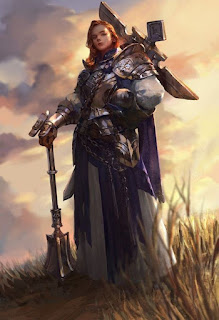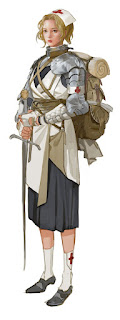For new players, it can be hard to choose your first class. For veteran players, it can be hard to choose a class and not fall into stereotypes everyone's seen a thousand times. So now I'm going to deconstruct the 5E Player's Handbook classes (Sorry Artificer, you'll come later) and talk about what works, what doesn't, and some interesting ways to play the classes.
I won't be going into game mechanics as much as I'll be going into roleplay.
Let's talk about Clerics!
(Hay look, it's a class that isn't automatically problematic!)
What is a Cleric?
The cleric class is based on the stories of saints, prophets and religious heroes. While not directly representing any one religion or philosophy, the cleric is the hero who has curried favor with the divine to heal the sick, see the future, and other miracles in the name of deity.
In Dungeons and Dragons clerics are the main healers in the game. Equipped with a plethora of buff/debuff spells plus the ability to spontaneously heal allies makes them a need for any adventuring group.
In the Game
Every deity in Dungeons and Dragons has clerics to worship them and teach others their ways. Technically more administrative than the paladin, the cleric's main role is to help others learn and live the tenants of their faith, like missionaries in full plate armor. The zealotry of the cleric differs based on the cleric and the religion. Some have more of a live-and-let-live vibe, while others will attack anything evil or unholy with a righteous zeal.
The biggest issue with the cleric in game is differentiating their role from the paladin. While both are great in combat, both can heal and both have religious bends to them, the main difference is that paladins are more combat focused, whereas clerics are more utility. Paladin is a massive hammer where clerics are a pocket tool brimming with gadgets.
While not immediately problematic, the cleric can have issues both in roleplay and in character design. The biggest problem is the same problem author Rick Riordan had when writing the Percy Jackson series. In his novels he wrote about a cult that worshipped Hera in modern day, not knowing that they're were groups that do worship Hera in the real world who took issue with their depiction. Most deities and religions in Dungeons and Dragons are made up by writers for the game and their accompanying fictions but some players like to either make overt references to real religions or wholeheartedly use ancient gods and practices in game. This can be offensive to someone who truly does believe in Thor when a player is a Thor worshipper. Others can be offended if the evil cult the group is trying to stop is a thinly veiled euphemism for their own religion. Remember when in doubt, err on the side of sensitivity to others.
As for in game I am going to break my own rules for a moment and talk about gameplay. Many players think of the healer in the group as the skinny kind in the back of the party casting healing spells and trying to stay out of combat. While, admittedly, this is a valid way to play the class it doesn't have to be the only way. Clerics can wear full armor with no penalty to their spellcasting and have several spells to enhance their own damage or armor at a moment's notice. It's not only possible, but almost game breaking to play a fully realized battle cleric, who wades into the thick of battle with the rest of the group and heals his fallen comrades as they fall next to him.
Breaking the Trope
Besides the aforementioned tank/Cleric I mentioned, there's almost endless ways to be the party healer. Here's just a few ideas:
The Missionary: The cleric can act as a missionary for their faith, traveling the world to spread the word. They'll stand in the middle of the town square and preach their teachings to the masses, sending them to temples and churches to join in the great work. For extra fun flavor, have two characters be missionaries and go straight up tracting through Baldur's Gate.
The Crusader: Great for multiclassing into ranger, the cleric is on a holy quest to vanquish some evil from the land. Make it as general as destroying all undead or as specific to challenging an evil organization or kingdom. Just remember: Don't be a jerk if someone else at the table is going to be something you hunt. Either find a way to loophole that character to be fine or just play as something else.
The Party Cleric: Most clerics choose either a righteous deity like Bahamut or some battle deity like Tempus, but why not choose something unusual? Why not Yondalla, goddess of halflings and have part of your duties be eating second breakfast? Or be a worshipper of Mielikki goddess of the forest and focus on the protection of nature? You could even ask the DM if you could have a homebrewed deity that resembles someone along the lines of Baccus the Greek god of wine and celebrations, or Loki the Norse trickster god? Mix it up and try something less holy by western standards and more wild. Then imagine what church is like for Baccus worshippers.
Famous Clerics
Fiction has healers and it has religious characters but rarely do they meet. That being said, here's a few of them.
Pike Trickfoot (Critical Role)
Starting off with once again Critical Role is the gnome cleric Pike. Despite her size she has demonstrated immense power in her service to the Everlight and is usually the one to patch up the heroes after a fight or if needs be drag them back from the dead.
Shepard Book (Firefly)
While not a healer in the traditonal fantasy sense, Shepard Book is a man who does gain power from his faith, and knows how to patch up a wound when needs be. He helps heal the lost and broken River Tam as she recovers from her time being experimented on, and he keeps the crews spirits in line even if they don't all see his doctrinal point of view.
Dr. Beverly Crusher (Star Trek: The Next Generation)
(Yes you can pretty much put any doctor from Star Trek in here but Beverly is my favorite so if you don't like it just insert Bones, Bashier, or The Doctor in here)
On the opposite side from Shepard Book is Dr. Crusher, a scientist who with the tools of the Star Trek universe can heal nearly any injury in the time it takes most people to tie their shoes. If you replace "I sense" with "My tricorder indicates" and "I cast Cure Wounds" with "Hand me the tissue regenerator" she could easily be any party's cleric.
-JOE





No comments:
Post a Comment